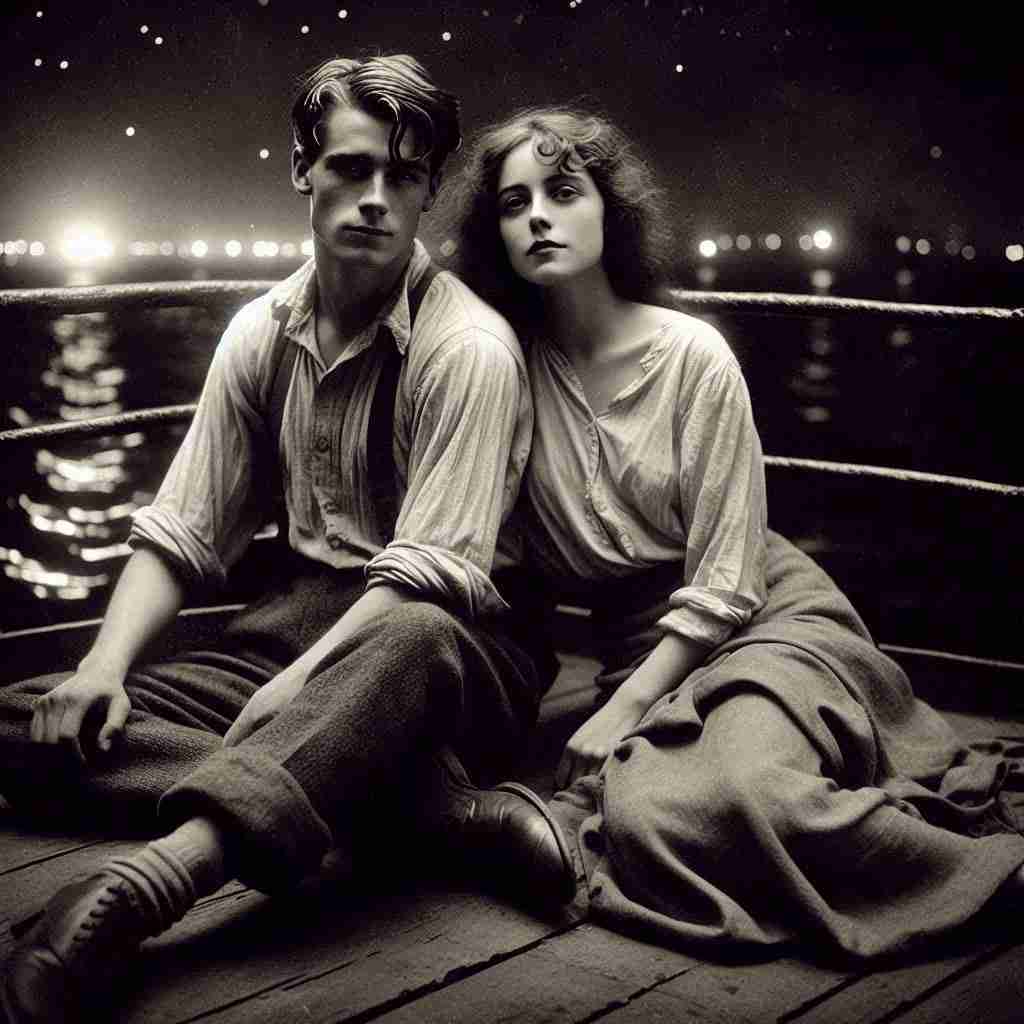Recuerdo
Edna St. Vincent Millay
1892 to 1950

We were very tired, we were very merry—
We had gone back and forth all night on the ferry.
It was bare and bright, and smelled like a stable—
But we looked into a fire, we leaned across a table,
We lay on a hill-top underneath the moon;
And the whistles kept blowing, and the dawn came soon.
We were very tired, we were very merry—
We had gone back and forth all night on the ferry;
And you ate an apple, and I ate a pear,
From a dozen of each we had bought somewhere;
And the sky went wan, and the wind came cold,
And the sun rose dripping, a bucketful of gold.
We were very tired, we were very merry,
We had gone back and forth all night on the ferry.
We hailed, “Good morrow, mother!” to a shawl-covered head,
And bought a morning paper, which neither of us read;
And she wept, “God bless you!” for the apples and pears,
And we gave her all our money but our subway fares.
Edna St. Vincent Millay's Recuerdo
Introduction
Edna St. Vincent Millay's "Recuerdo" is a masterful exploration of youthful exuberance, the fleeting nature of time, and the bittersweet essence of memory. This poem, with its deceptively simple structure and repetitive elements, encapsulates a profound moment of joy and connection, while simultaneously hinting at deeper themes of transience and social awareness. Through a careful analysis of its form, imagery, and thematic content, we can uncover the layers of meaning woven into this seemingly straightforward recollection of a night's adventure.
Form and Structure
The poem's structure is immediately striking, with its use of couplets and a repeating refrain. This formal choice echoes the cyclical nature of the ferry ride described within the poem, creating a rhythmic quality that mimics the back-and-forth motion of the boat. The repetition of the lines "We were very tired, we were very merry— / We had gone back and forth all night on the ferry" serves multiple purposes. It acts as an anchor for the reader, grounding us in the central experience of the poem. Additionally, this repetition reinforces the sense of time passing, of a night that seems both endless and fleeting.
Millay's use of rhyming couplets throughout the poem creates a sing-song quality that enhances the feeling of youthful abandon. The simplicity of the rhyme scheme (aa, bb, cc, etc.) belies the complexity of the emotions and experiences being described. This juxtaposition of formal simplicity with emotional depth is a hallmark of Millay's work, allowing her to convey profound truths through seemingly uncomplicated verses.
Imagery and Sensory Details
The poem is rich with vivid imagery and sensory details that bring the night's adventures to life. Millay's choice of specific, concrete images helps to root the poem in a particular time and place, while also evoking universal experiences of youth and discovery. The ferry, described as "bare and bright," and smelling "like a stable," is both a physical setting and a metaphor for the journey of life itself.
The progression of images throughout the poem traces the arc of the night into morning. We move from the interior of the ferry to a hilltop under the moon, then to the dawning of a new day with its "dripping" sun, "a bucketful of gold." This transition is marked by sensory details that engage multiple senses: the smell of the ferry, the sound of whistles blowing, the taste of apples and pears, the feeling of the wind turning cold. These details serve to immerse the reader in the experience, making the memory feel immediate and tangible.
Themes of Youth and Time
At its heart, "Recuerdo" is a poem about the intensity of youthful experience and the bittersweet nature of memory. The repeated refrain of being "very tired" yet "very merry" encapsulates the paradoxical energy of youth—the ability to push beyond physical limits in pursuit of joy and experience. This duality is central to the poem's exploration of time and its passage.
The night described in the poem exists in a liminal space, suspended between yesterday and tomorrow. The ferry's constant motion becomes a metaphor for the passing of time, yet there's a sense of timelessness in the adventure, a feeling that this night could go on forever. However, the inevitable arrival of dawn serves as a reminder of the transient nature of all experiences, no matter how intense or meaningful.
Social Awareness and Compassion
While the majority of the poem focuses on the personal experiences of the speaker and their companion, the final stanza introduces a moment of social awareness that adds depth and complexity to the narrative. The encounter with the "shawl-covered head," presumably an older woman or perhaps someone experiencing homelessness, brings the youthful revelry into sharp contrast with the realities of the wider world.
The decision to give away "all our money but our subway fares" is a poignant moment that speaks to the idealism and generosity often associated with youth. It suggests a recognition of privilege and a desire to share the joy of the night with others, even in a small way. This act of kindness, coming at the end of a night of personal indulgence, adds a layer of social consciousness to the poem, hinting at the complexities of the world beyond the speakers' immediate experience.
Language and Tone
Millay's use of language throughout "Recuerdo" is deceptively simple. The vocabulary is straightforward, the sentences direct, yet they convey a depth of emotion and experience that belies their simplicity. This accessible language allows the poem to resonate with a wide audience, evoking universal experiences of youth, joy, and the passage of time.
The tone of the poem strikes a delicate balance between celebration and nostalgia. While the events described are joyful, there's an undercurrent of wistfulness, a recognition that this perfect night is already becoming a memory even as it's being experienced. This duality is captured in the very title of the poem, "Recuerdo," which means "I remember" in Spanish, framing the entire piece as a recollection rather than an immediate experience.
Symbolism and Deeper Meanings
Several elements within the poem carry symbolic weight that adds to its overall meaning. The ferry itself can be seen as a symbol of transition, not just between physical locations but between states of being—from youth to adulthood, from one phase of life to another. The apples and pears, shared between the companions, evoke biblical imagery of temptation and knowledge, suggesting that this night represents a kind of awakening or initiation.
The progression from night to day, with its "wan" sky and "cold" wind, could be read as a metaphor for the transition from the protected world of youth to the harsher realities of adulthood. Yet the rising sun, described as "a bucketful of gold," offers a hopeful counterpoint, suggesting that beauty and value can be found even in the cold light of day.
Conclusion
"Recuerdo" stands as a testament to Edna St. Vincent Millay's ability to capture complex emotions and experiences in seemingly simple verse. Through its careful balance of form and content, its vivid imagery, and its exploration of universal themes, the poem offers a multilayered meditation on youth, time, and the nature of memory.
The power of "Recuerdo" lies in its ability to evoke a specific moment while simultaneously speaking to broader human experiences. It captures the essence of what it means to be young and alive, to feel deeply connected to another person and to the world around you. At the same time, it acknowledges the fleeting nature of such moments and the inevitability of change.
In the end, "Recuerdo" is not just a recollection of a single night's adventure, but a reflection on the way we experience and remember the pivotal moments of our lives. It reminds us of the intensity with which we live in our youth, the joy we find in connection and experience, and the bittersweet nature of memory. Through its artful simplicity, Millay's poem invites us to reflect on our own moments of transcendence and the memories we carry with us as we move through life's endless cycle of nights and days.
This text was generated by AI and is for reference only. Learn more
Want to join the discussion? Reopen or create a unique username to comment. No personal details required!



Comments
No comments yet. Be the first to comment!